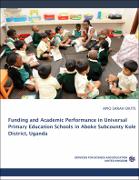| dc.contributor.author | Okite, Apio Sarah | |
| dc.date.accessioned | 2021-08-01T17:57:59Z | |
| dc.date.available | 2021-08-01T17:57:59Z | |
| dc.date.issued | 2021 | |
| dc.identifier.uri | 10.14738/eb.165.2021 | |
| dc.identifier.uri | https://hdl.handle.net/123456789/307 | |
| dc.description.abstract | Study findings on the effects of education funding on student performance have been inconsistent. Some have indicated that it is how money is spent and not how much is available that determine academic outcomes. In Uganda, poor performance of Universal Primary Education (UPE) schools has partly been blamed on ineffectively utilization of UPE funds disbursed by government. This study aimed at establishing the relationship between funding and academic performance of such schools in Aboke sub-county, Kole District, northern Uganda. A cross-sectional study design was adopted where both qualitative and quantitative research approaches were used. Six schools out of 13 and a total of 165 respondents were sampled purposively or randomly to constitute study samples. Questionnaire, interview and documentary review methods were used to collect primary and secondary data. Tool validity was ensured through pre-testing while reliability was tested using Cronbach’s alpha test of reliability. Quantitative data were analyzed using the Statistical Package for Social Sciences (SPSS) while content analysis was used for the qualitative data. A total of 85.7% agreed on the availability of instructional materials. The role of the SMC in academic performance was established as not being clear (48.7%) while on average, majority of the respondents (53.5%) supported the statements about PTA. The Pearson Correlation findings indicate positive strong and statistically significant relationships between the size of financial disbursement and academic performance; timing of disbursement and academic performance; accountability and academic performance; and between accountability and funding. The regression analysis indicated that the funds size, disbursement timing and funds utilization have a significant combined effect on academic performance of UPE schools. It was concluded that low level of funding leads to poor performance of schools and that the size of funding greatly affects the academic performance compared to the timing of disbursement. It was recommended that the Government should improve UPE funding so as to improve academic performance of UPE schools | en_US |
| dc.language.iso | en | en_US |
| dc.publisher | Society for Science and Education (United Kingdom) | en_US |
| dc.subject | Academic performance | en_US |
| dc.subject | Universal primary education | en_US |
| dc.subject | Funding | en_US |
| dc.subject | Uganda | en_US |
| dc.title | Funding and Academic Performance in Universal Primary Education Schools in Aboke Subcounty Kole District, Uganda | en_US |
| dc.type | Article | en_US |

